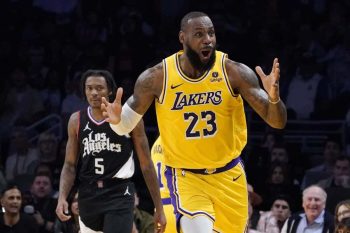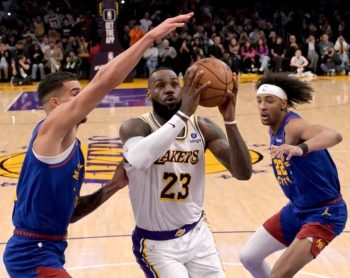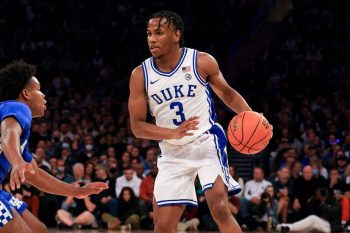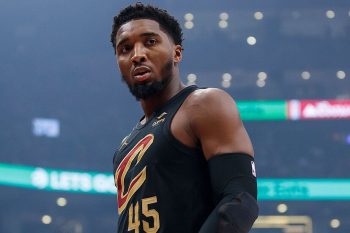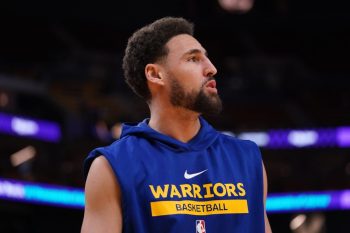NBA
NBA PM: Projecting the Rookie of the Year Race
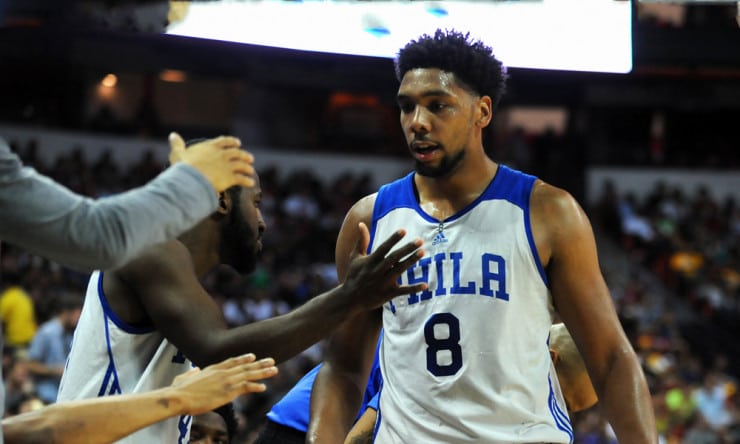
With the calendar flipping over to August, this year’s class of rookies have been with their respective teams for about five weeks now. Players are starting to get a feel for their new team and, by now, have had extensive meetings with their respective coaching staff. They’ve had a taste of NBA action after playing a handful of games in Summer League. Although it’s just Summer League and a small sample size, we’re beginning to have an idea of how some players will adjust to the NBA.
Over the last 15 years, only five No. 1 picks have won the Rookie of the Year award. The lowest selection to win ROY was Michael Carter-Williams at No. 11 in 2013. This year’s crop of rookies seem poised to be one of the more competitive classes in recent memory.
It’s never too early to start ranking the players, so here’s an early look at each lottery pick’s chances of winning the Rookie of the Year award. These predictions take into account each player’s situation and NBA readiness.
6. Karl-Anthony Towns, Minnesota Timberwolves:
Towns will likely be in the conversation all season long by virtue of being the No. 1 pick, but ultimately may not win the award. He was drafted for his potential so he may not post great numbers right away. Also, he’ll be fighting for minutes in the Timberwolves’ frontcourt with big men like Nikola Pekovic, Kevin Garnett and Gorgui Dieng, so he may not have a huge role right off of the bat.
Minnesota’s deep frontcourt could be very beneficial to Towns in the long-run as it will let him develop more at his own pace instead of forcing him to try to carry the team. The Wolves won’t be competing for a playoff spot so he could see playing time to work through mistakes and to get adjusted to the NBA.
5. Myles Turner, Indiana Pacers:
The Pacers are looking to push the pace this season and Turner seems to be a great fit for that style. He’s extremely active on the floor and can do a lot of things for the Pacers. In the Orlando Summer League, Turner averaged 18.7 points, 8.3 rebounds and 4.3 blocks in three outings.
With no established starting center on the team after the Roy Hibbert trade, Turner could find himself as a starter sooner than later. The team could opt to start veteran Ian Mahinmi ahead of Turner to begin the season, but Turner could find himself in that role as he gets more adjusted to the NBA. If the playing time is there for Turner, he could be a dark-horse candidate for Rookie of the Year.
4. Stanley Johnson, Detroit Pistons:
Johnson is perhaps the first player we’ve covered thus far that has a legitimate chance at winning Rookie of the Year honors, or at least the first one that will be in the conversation. Johnson was regarded as one of the more NBA-ready players in the draft, and he will provide Stan Van Gundy with great defense and solid offense.
Johnson finished fourth in scoring at the Orlando Summer League with 16.2 points per game on 58 percent shooting from the floor. He also added 6.8 rebounds, two assists, 1.8 steals and one block per game in five outings. Playing for a team that won 32 games last season, Johnson figures to have a great chance of starting out of the gate and play his way into the ROY discussion.
3. D’Angelo Russell, Los Angeles Lakers:
Russell will surely get a chance to see plenty of playing time from the start of the season. Having passed on Jahlil Okafor, the Lakers surely view Russell as their next star and will be relying on him to be their best playmaker behind Kobe Bryant.
As his play in Summer League indicates, he’ll go through his typical ups-and-downs as a rookie. Russell turned in a sub-par Summer League, averaging 11.8 points on 38 percent shooting from the floor, 5.2 rebounds and 3.2 assists per game while also averaging 5.2 turnovers. His high turnover margin was likely due to rookie jitters and an attempt to create offense. Some of his turnovers were good turnovers, as he was trying to do the right thing but the end result just didn’t happen. Others were mistakes he needs to fix.
It’s clear that Russell’s upside and shooting ability is what intrigued the Lakers. After adjusting and growing through his rookie pains, Russell could be a star. He’ll be in the conversation all season long for Rookie of the Year and benefits by having a chance to play a ton of minutes (on a huge stage with the Lakers).
2. Emmanuel Mudiay, Denver Nuggets:
The events of this offseason have aligned almost perfectly for Mudiay. After trading away long-time starting point guard Ty Lawson, there are plenty of minutes for Mudiay in the Nuggets’ backcourt. The team brought back Jameer Nelson, but will likely bring him off of the bench behind Mudiay.
Mudiay impressed in Summer League, averaging 12 points, 5.8 assists and 3.5 rebounds per game. His shooting numbers were off a bit (39 percent from the floor), but that could be a product of him trying to carry his teammates as he averaged 13 shot attempts per game. He flashed his speed, court vision and all of the necessary skills to be a productive NBA point guard throughout his four games in Las Vegas. If first-year head coach Mike Malone plays Mudiay as much as expected, he could be a legitimate contender for Rookie of the Year (especially since he could thrive in Denver’s up-tempo system).
1. Jahlil Okafor, Philadelphia 76ers:
It’s very likely that Okafor will be heavily considered for Rookie of the Year honors. He has already demonstrated that he’s ready to come into the league and contribute right away. He also benefits from playing on a 76ers team that will be counting on him to carry the squad and produce at a high level.
Pairing Okafor with Nerlens Noel should make for one of the best young frontcourts in the league. Okafor can get the job done offensively, while Noel can pick up the slack defensively. Okafor averaged 15.8 points and 8.4 rebounds in Vegas, which could be a preview of what his regular season numbers look like.
Honorable Mention:
Justise Winslow, Miami HEAT:
One of the biggest questions following the draft was, how did Winslow fall to the HEAT at No. 10? It was clear that teams didn’t have him as high on their boards as the media did, but the HEAT were ecstatic to land Winslow.
The playing time likely won’t be there to earn himself a Rookie of the Year award, but Winslow will instead get a chance to learn from one of the best at the position in Luol Deng. The expectations for Winslow won’t be nearly as high as they would have been if he was selected higher, which will allow him to just play basketball without the added pressure of having to do too much.
He’s a huge addition for the team’s second unit and will be a guy that they can count on to defend and score. Head coach Erik Spoelstra could also opt to put him into the starting lineup on nights in which Dwyane Wade gets a rest, or if Wade or Deng should become injured.
Kristaps Porzingis, New York Knicks:
The biggest knock coming in for Porzingis is his size. He’ll need time to bulk up some to have the size needed to defend NBA big men. With Derrick Williams, Robin Lopez and Kyle O’Quinn on the roster, the Knicks won’t necessarily need physicality from Porzingis.
In any case, it doesn’t seem likely that Porzingis will put up the numbers needed to win ROY, but rather will progress slowly throughout the season. He’s more raw than some of the other prospects on this list. Still, the Knicks drafted a guy who has the potential to be a great talent for many seasons to come. Even though he’ll need time to develop, he certainly didn’t deserve the boos he received on draft night.
Cameron Payne, Oklahoma City Thunder:
The Thunder picked up great value in Payne considering where they were selecting in the draft. By this time, most of the huge-impact type of players were off of the board, but Payne is a player who can step in and provide the team with scoring and spacing.
Unfortunately for Payne, he missed Summer League with a broken finger so he has yet to see his first NBA action. He comes into a situation in Oklahoma City where the starting lineup is already locked in, but he’s a good fit into their system and should have a productive rookie campaign filling the sixth man role.
Devin Booker, Phoenix Suns:
Many had Booker projected to go to the Miami HEAT to help fill their three-point shooting needs, but he ultimately fell down to the Suns at number 13. Phoenix appeared to take the best talent available at this pick, as Booker doesn’t really seem to solve any one need the Suns have. He’s a proven shooting threat after knocking down 41 percent of his three-point shots in college, but may not see a lot of time initially to help the team improve in that department.
The Suns are a young team and one that fully expects to compete this season in the Western Conference after adding Tyson Chandler to their young core. Booker figures to be behind Eric Bledsoe and Archie Goodwin on the depth chart, so he’ll have to really impress in training camp to earn playing time.
Trey Lyles, Utah Jazz:
The Jazz have one of the league’s most promising young cores. Adding Lyles was great, as it helps bolster their second unit. Lyles figures to see time behind Derrick Favors at power forward, but could see time at center if the Jazz opt to run small.
The Jazz were said to be in love with Lyles during the pre-draft process, and as a result felt very good about their draft. Lyles could make some noise this season in a backup role, and more importantly, help the Jazz make a run toward the playoffs.
Frank Kaminsky, Charlotte Hornets:
It’s clear that Kaminsky was at the top of the Hornets’ draft board. The team was reportedly offered up to six future draft picks (including four first-round picks) for the ninth pick, but they rejected the offer and ultimately chose to draft Kaminsky.
He came into the draft as one of the hottest college players out there, but his role with the Hornets remains to be seen at the moment. He may have to come off the bench behind Al Jefferson and Cody Zeller, but does figure to contribute when he does play since he’s very NBA-ready at 22 years old. But barring an injury to Jefferson or Zeller, Kaminsky likely won’t be a serious contender in the Rookie of the Year race.
Willie Cauley-Stein, Sacramento Kings:
Right off of the bat, it wouldn’t seem likely that Cauley-Stein has a chance for Rookie of the Year. Voters want to see the stats to back up winning the award, and those stats are often on the offensive end, which isn’t one of Cauley-Stein’s biggest strengths.
There’s no question that he’ll provide great interior defense and will form a solid frontcourt duo with DeMarcus Cousins, but he likely won’t be putting up huge offensive numbers. His offensive game will be a work in progress, which means he likely won’t be in the mix for this award.
Mario Hezonja, Orlando Magic:
The Magic opted to go all-in on drafting offensive players this year, after previously drafting defenders players in past years. Hezonja brings a lot of upside on the offensive end of the floor as he’s able to create his own shot and knock down three-point shots. However, he may not see a lot of time on the court, playing behind Tobias Harris and Victor Oladipo, but could provide a spark off of the bench in certain situations. As a result, he likely won’t be in the hunt for the ROY, but should have a productive season.
*****
Based on what we know about each player drafted in the lottery, it would seem likely that Russell, Okafor, Mudiay, Johnson and Turner are the five players with the best Rookie of the Year odds entering the season. Of course, that could change depending on how rotations shake out and if any injuries occur.
While the odds are historically in favor of one of the above 14 players to win the award, players outside of the top 14 could have a chance to be in the conversation as well. Terry Rozier, Rashad Vaughn and Jerian Grant among others all could play their way into the conversation as well.

